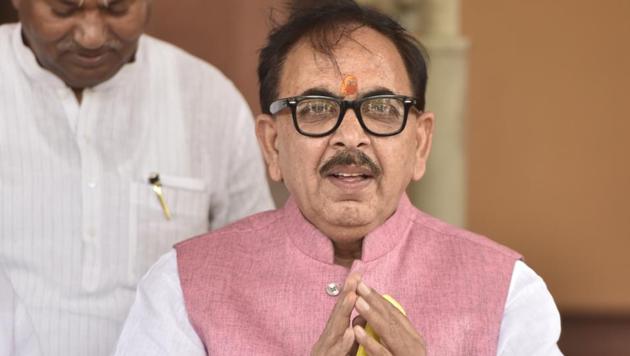We don’t intend to slow down training, will ready people for Industry 4.0: Minister Mahendra Nath Pandey
Union minister Mahendra Nath Pandey says though the coronavirus will undoubtedly impact the economy and industries will see sluggish growth, yet the government does not intend to slow down the process of training and readying people especially in skills for Industry 4.0.
As the country braces for the impact of the Covid-19 pandemic on the economy and the job sector, Minister of State for Skill Development and Entrepreneurship, Mahendra Nath Pandey, told HT in an email interview that the focus will be on imparting training and ensuring measures to re-skill and upskill young people. Edited excerpts:

How is the ministry meeting the challenges brought on by the pandemic?
The ministry has aligned its efforts with the Centre and has extended support to the Ministry of Health and Family Welfare (MoHFW) by making their National Skill Training Institutes (NSTIs), their hostels and the Industrial Training Institutes (ITIs) in the country available for converting them into quarantine or isolation facilities so that we have enough wards to observe and treat those infected by the virus. We have also shared the details of nearly one lakh candidates skilled in healthcare related sectors through various programmes under the Skill India Mission. These professionals will help in containing the spread of the infection and efficiently manage patients in quarantine and hospital facilities that will be set up in the coming days. Additionally, a list of 2000 healthcare trainers and more than 500 healthcare assessors have also been shared with MoHFW, who can be utilised for services.
We have also taken steps to ensure that candidates undergoing apprenticeship training across various establishments do not suffer from the economic impact of the infection. MSDE has notified all establishments under designated and optional trade to pay full stipend to apprentices engaged with them. The government will reimburse stipends to these establishments under National Apprenticeship Promotion Scheme (NAPS) for the lockdown period as per guidelines.
What is the number of those who will be reimbursed?
Currently there are 24,884 establishments engaging 2.42 lakh apprentices in both designated and optional trade. As per the provision under NAPS, the government reimburses 25% of the stipend amount to be paid to apprentices per month subject to a maximum of Rs 1500 per month. During the lockdown period due to Covid-19 pandemic, the government will be paying approximately Rs 36.30 crore to the establishments who would be claiming reimbursement for engaging apprentices under NAPS during this period
Every sector is expected to reel under from the impact of the pandemic. There are projections of job losses. How will the ministry ramp up efforts at skilling so that people can be self-reliant?
The virus will undoubtedly impact the economy and industries will see sluggish growth, especially in sectors like aviation, tourism and hospitality and automobile. However, we do not intend to slow down the process of training and readying people especially in skills for Industry 4.0 that will definitely gain more in importance once we get over this crisis. We will continue to assess the situation and, in line with the directives provided by the Central Government, extend the necessary support.
Our commitment to the people and to the economy remains unchanged; we will gradually speed up the skilling efforts, impart trainings and ensure measures to reskill and upskill young people. Some of our trainees in short-term training programmes and Jan Shikhsa Sansthans have committed themselves to the service of the nation by manufacturing and producing masks and sanitisers, operating from their homes.
What is the feedback from your interaction with people on the ground, what is the initial assessment of the lockdown and what has emerged as areas that need focus?
Both members of the public and industry feel we need to first control the spread of this deadly virus and then go ahead with the revival work. So far, India has been successful in managing the spread of Covid-19 with measures like lockdown and underlining the importance of social distancing. Of course, there is the concern that the virus is outpacing the economy and it is true to some extent. Industries have suffered, people are worried about their livelihoods and jobs. However, the government has taken deep and preventive measures to address some of these concerns and have promised that livelihoods will be protected.
We have seen how even developed countries have been affected by this pandemic and we must learn from these examples and win again this outbreak. At this point, the government’s priority is to save lives and stop the virus from spreading and that is possible only through strict adherence to social distancing, by staying at home. Only then will we be able to flatten the curve.






